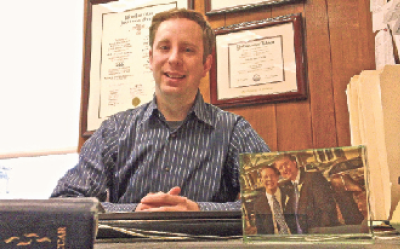For Rabbi Andrew Gordon, this Passover is different than all other Passovers because he is serving the Jewish community as an openly gay man and the son of an interfaith couple.
Gordon, an associate rabbi at Temple Sinai in Roslyn Heights since July 2012, gave a sermon during the Temple’s ‘Interfaith Experience’ service March 15 which detailed his growing up in an interfaith household as well as being accepted by Roslyn’s Jewish community as a gay religious figure.
“As a religious figure in favor of LGBT rights, I have to speak about it because so much of the discussion is so negative so that my opinions are heard in the public sphere,” Gordon said. “I want people to realize that Judaism and religion and God are welcoming of people regardless of their sexual orientation.”
Gordon said acceptance of his view is reflected in a new tradition that has gained traction at the Passover table in recent years – the addition of an orange to the plate of the bitter herb, egg, lettuce, parsley, heroseth and shank bone.
The orange, he said, is meant to symbolize equality and the continued march toward freedom, specifically in the LGBT community, where the national discussion has heated up as many states continue to legalize gay marriage.
On a national level, gay rights issues have been discussed through a largely conservative religious culture that sees homosexuality as immoral and going against God’s will, Gordon said. The Catholic Church in particular, which has the largest contingent of followers in the United States, has continued to reinforce its stance against gay marriage, though a recent NPR report suggests 58 percent of Americans are now in favor of gay marriage, opposed to only 13 percent in 1977.
“I don’t speak about [gay rights] every week, but I think it’s important to my identity as to who I am as a person,” he said. I think it’s important for our gay sons and daughters in the community to know that reformed Judaism is safe, a place where they can be open and be accepted. Liberal movements in America and within Christianity don’t speak out forcefully enough in the public sphere as some of the more conservative denominations of America do.”
Gordon, who grew up heavily involved in various Jewish youth group organizations and graduated with high honors from the University of Michigan in 2001 with a B.A. in History and Judaic Arts, said he came out as a gay man at about the time he began applying to rabbinical schools.
In exploring different traditions of Jewish faith, he found that reformed Judaism, which takes a more liberal approach to traditional Jewish beliefs and values, had been among the most supportive of openly gay students, he said.
“The reformed movement was so welcoming that [coming out] wasn’t an issue,” he said. “Had I come out 10 years earlier, it might have been more of a struggle.”
Gordon said his family and friends were as supportive of his decision to come out as they were of him when he lived as a straight man. Gordon and his partner Ben ten Siethoff, though not officially “married” in the eyes of the law, have a healthy domestic partnership, and recently welcomed a baby boy, Caleb, into their family.
Gordon has also experienced the struggle that comes with being the son of an interfaith couple, as his mother, raised a Lutheran, converted to Judaism after marrying into the faith and becoming what’s known in the Jewish community as a “Jew by choice.”
Gordon’s mother was given the “cold shoulder” and had been ridiculed from neighbors within the Jewish community prior to moving to Toledo, Ohio, where Gordon grew up, even as interfaith marriages began to become more commonplace, he said.
“I think that her view was that she wanted to have one religion in the home and she knew how important it was to my father that their kids grow up Jewish too,” he said. “It wasn’t an easy choice for her because it meant she had to set aside some of the morals and ethics she grew up with and parting with some of the holidays she had grown up celebrating, but it felt right to her to become one of the Jewish people.”
Today, the rabbi cites his mother as a “driving force” behind his family’s involvement in the faith, from celebrating Jewish holidays to attending temple services.
“I think the Jewish community has come far within the last few generations of accepting Jews By Choice and interfaith couples, but certainly the world at large is still working toward fully accepting them,” he said. “Temple Sinai has really made a point to be accepting of interfaith couples, but we’re not finished.”



